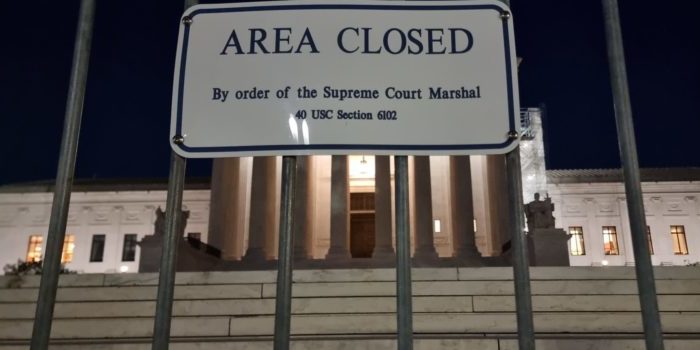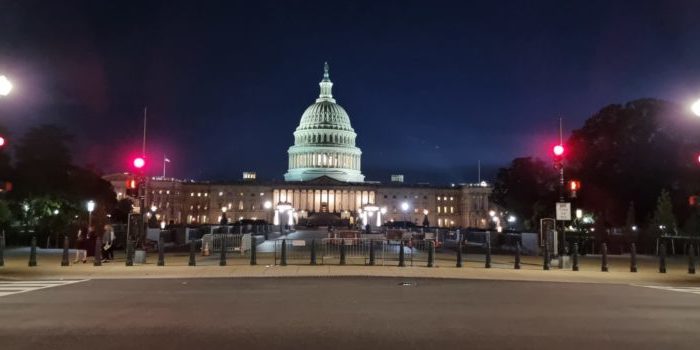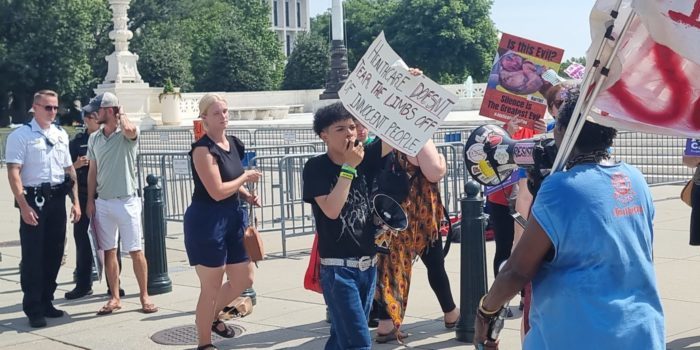(Ben Sellers, Headline USA) CAPITOL HILL–Yandel Burke, 18, of Riverside, Calif., said he had tried to raise important questions during the pandemic via social-media platforms like Instagram, only to find his posts were being censored with little or no justification.
“I tried to speak out about COVID and how the vaccine—people shouldn’t have gotten it, because it was just something that was created by the government to see how well people would react if they were to be ‘controlled’—medically controlled and stuff like that,” Burke said Wednesday morning outside the Supreme Court, where he was once again speaking out as part of the pro-life group Survivors.
“It turned out, I was right,” Burke added about his vaccine hesitancy.
On that last point, however, the Supreme Court begs to differ. Just minutes before, it had released a landmark decision in Murthy v. Missouri (a case that had worked its way through the courts under the name Missouri v. Biden) effectively upholding the federal government’s right to “listen in” on social-media chatter and to exert its own outsize influence over the dialogue—up to and including the outright control and suppression of factual information.
The original plaintiffs in the case—led by the Republican attorneys general for the states of Missouri and Louisiana (both of whom have since gone on to higher office as a U.S. senator and governor, respectively)—had argued that, even though the platforms in question were private companies enforcing their own internal “terms of service,” the level of collusion with government entities had crossed the line into flagrant free-speech violations on an array of hot-button issues.
“[T]he plaintiffs emphasize that hearing unfettered speech on social media is critical to their work as scientists, pundits, and activists,” wrote Justice Amy Coney Barrett for the majority opinion.
“But they do not point to any specific instance of content moderation that caused them identifiable harm,” she added. “They have therefore failed to establish an injury that is sufficiently ‘concrete and particularized.'”
The 6-3 ruling reversed the decision of the 5th Circuit Court of Appeals, which found in favor of the two states and other parties who had joined the lawsuit, and remanded the case back to the lower court for further consideration.
“The plaintiffs, without any concrete link between their injuries and the defendants’ conduct, ask us to conduct a review of the years-long communications between dozens of
federal officials, across different agencies, with different social-media platforms, about different topics,” Barrett wrote. “This Court’s standing doctrine prevents us from ‘exercis[ing such] general legal oversight’ of the other branches of Government.”
‘BULLY PULPIT BEYOND BREAKING POINT’

In a dissenting opinion joined by justices Clarence Thomas and Neil Gorsuch, Justice Samuel Alito criticized the majority for its narrow interpretation in a case with such far-reaching implications.
“If the lower courts’ assessment of the voluminous record is correct, this is one of the most important free speech cases to reach this Court in years,” Alito wrote. “Freedom of speech serves many valuable purposes, but its most important role is protection of speech that is essential to democratic self-government.”
Alito said the pressure government agencies put on social-media networks had gone beyond simple auditing of online channels and amounted to a campaign of constant hectoring, as well as threats of political consequences for noncompliance.
“If these communications represented the exercise of the bully pulpit, then everything that top federal officials say behind closed doors to any private citizen must also represent the exercise of the President’s bully pulpit,” he wrote. “That stretches the concept beyond
the breaking point.”
Among the verboten topics was debate over controversial government vaccine mandates that forced people to make snap judgements under duress between their long-term health and their short-term livelihoods, while being denied a full set of facts.
Evidence continues to mount that there may be serious medical side effects associated with the experimental mRNA shots, which a federal court recently ruled cannot legally be considered vaccines.
In young men Burke’s age—for whom the COVID mortality rate without mitigating risk factors is near zero—the so-called cure may, in fact, be worse than the disease.
“Even though they censored my posts … they ended up saying that we didn’t even really need the COVID vaccine,” Burke noted. “So it’s like, ‘why did you guys mandate it and then say that we didn’t need it anymore?'”
SINISTER SILENCE AND SUPPRESSION
Burke’s story is not unique. Social-media sites including Meta-owned Facebook and Instagram, Alphabet-owned Google and YouTube, Twitter (prior to its purchase by red-pilled billionaire Elon Musk), LinkedIn and several other tech companies shut down public discussion at one of the nation’s most critical junctures, fomenting deep divides and distrust that continue to ripple throughout the political discourse.
The culminating event, perhaps, was the primal scream of thousands of silenced voices just across the street from the Supreme Court, at the U.S. Capitol, on Jan. 6, 2021.

It later came to light that intelligence agencies like the FBI, as well as public health agencies—and even the Biden campaign—had exerted considerable influence over the messaging of those social-media companies using back-channel communications.
As Burke observed, that sometimes included the active and deliberate spread of disinformation.
Social-media companies egregiously made the decision to censor information about Hunter Biden’s “laptop from hell” shortly before the 2020 election—a factor that many concur might have swayed their decision.
President Joe Biden was allowed to blatantly lie about the laptop, deceptively claiming that 51 intelligence sources believed it to be Russian propaganda.
Evidence now shows that the source of that initiative was none other than Biden’s own campaign operative—now Secretary of State Antony Blinken.
“I think it’s really wrong, the fact that the government is trying to regulate what’s on social media and tell the people what is ‘misinformation’ and what isn’t, because it’s just about control,” Burke said. “It’s all about control—they want to control what we see, they want to control our views on life.”
Conservative news site the Gateway Pundit was among those who joined the Missouri lawsuit as a concerned party, arguing that the FBI and the Cybersecurity and Infrastructure Security Agency had conspired to censor its stories about the laptop by urging Twitter to suspend the account of Pundit editor Joe Hoft, the twin brother of founding publisher Jim Hoft.
However, Barrett and company opted to pick nits and dismiss the Hoft brothers’ argument on a technicality, claiming a lack of standing due to the two letters difference in the name of the person who formally filed suit.
“[Jim] Hoft provides no evidence that Twitter adopted a policy against posting private, intimate content in response to the FBI’s warnings about hack-and-leak operations,” the Barrett’s opinion claimed.
“Plus, it was Hoft’s brother, Joe Hoft, who posted this tweet; Twitter therefore suspended Joe Hoft’s account,” she continued. “It is unclear why Jim Hoft would have standing to sue for his brother’s injury.”
A GRIM DIAGNOSIS
Much of the evidence regarding the secret collusion between the FBI and Twitter did eventually surface after Musk purchased the company and released the “Twitter Files,” recruiting trusted, nonpartisan journalists such as Matt Taibbi, Michael Shellenberger and Bari Weiss to peruse the troves of damning correspondence.
Meta CEO Mark Zuckerberg also acknowledged his company’s relationship with government agencies—but only after the Left’s desired outcomes, including the removal of then-President Donald Trump and the installation of Biden, had been accomplished.
The court’s ruling may well embolden corrupt government agencies and woke online publishers to engage openly in even more brazen censorship campaigns, potentially exerting a chilling effect on the upcoming 2024 election at yet another critical moment.
“Most Americans are online, and if you’re able to censor what they’re seeing on a day-to-day basis, it’s almost kind of like programming in a way, you know—and it’s wrong,” said Burke.
“It’s disgusting, and I think more people need to open their eyes to what’s happening in America because we’re slowly being brainwashed,” he added. “We’re all slowly being brainwashed, and their main target is the younger audience—people like me and younger.”
Ben Sellers is the editor of Headline USA. Follow him at twitter.com/realbensellers.

